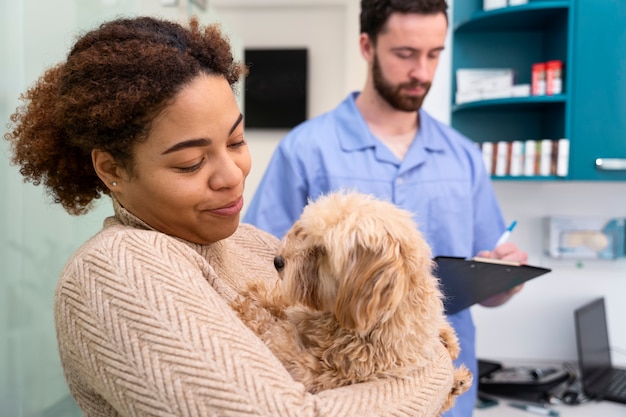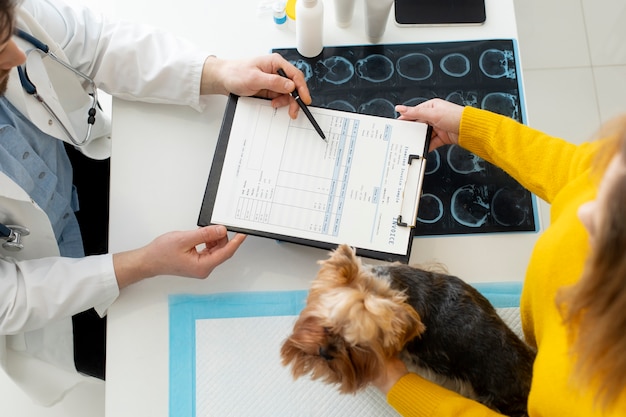Understanding Pet Soft Tissue Surgery: What Flemington Owners Should Know


Understanding Pet Soft Tissue Surgery: What Flemington Owners Should Know
When your pet needs surgical care, it is natural to feel concerned and want the best, most compassionate treatment available. At Clover Hill Animal Hospital, we understand how important your pet is to your family and how stressful the idea of surgery can be. Our veterinary professionals in Flemington, NJ are dedicated to providing skilled and gentle care, ensuring that each patient receives individualized attention before, during, and after their procedure. If you have been searching for a "vet near me" who can handle a range of pet surgical needs, especially soft tissue procedures, you have come to the right place.
This blog will help you understand what pet soft tissue surgery involves, which conditions may require these procedures, how surgeries are performed, and what postoperative pet care looks like. Whether your companion is a dog, cat, or exotic pet, our team will guide you every step of the way, so you feel informed and confident in your decision. We will also highlight the importance of timely veterinary care, including when to schedule an appointment with our experienced veterinarians. For more specific information about our surgical offerings, you can explore our dedicated page on pet soft tissue surgical procedures.
Let us walk you through the essentials of pet soft tissue surgery in Flemington and surrounding communities, ensuring you know what to expect so you can keep your pet healthy and comfortable.
Recognizing the Need for Pet Soft Tissue Surgery
Understanding when your pet may need surgical intervention is the first step in advocating for their health. Soft tissue surgery refers to procedures that target organs, skin, muscles, or other tissues not involving bones or joints. Some of the most common scenarios requiring pet soft tissue surgery in Flemington involve masses or lumps, wounds that do not heal, abscesses, and certain internal conditions such as bladder stones or gastrointestinal obstructions.
Key symptoms include persistent swelling, unexplained lumps, open wounds that do not heal, difficulty urinating or defecating, vomiting, loss of appetite, or visible discomfort when moving. Additionally, you may notice behavioral changes such as increased hiding, reluctance to play, or vocalizing in pain. These signs can be particularly worrying because many soft tissue issues do not improve with home care alone.
If you spot any of these symptoms, it is essential to contact your veterinary team as soon as possible. Early intervention often means a simpler procedure and a faster recovery for your pet. It is always better to err on the side of caution and schedule a veterinary evaluation when something seems off, especially if you are looking for "quality veterinary services near me" that can address the full spectrum of pet health needs.
What Causes Soft Tissue Conditions in Pets?
Pets can develop soft tissue problems for a variety of reasons, and understanding the underlying causes can help you recognize risk factors and seek timely care. Common causes include trauma, such as bites, scrapes, or car accidents, which often result in wounds or abscesses that may require surgical repair. Tumors or growths, both benign and malignant, can develop in the skin, mammary tissue, or internal organs, sometimes needing removal for your pet’s comfort or overall health.
Infections are another frequent culprit. For example, a cat might develop an abscess after a fight, or a dog may experience a deep skin infection that does not respond to antibiotics alone. Foreign bodies, such as swallowed toys, bones, or plant materials, can become lodged in the digestive tract or other organs, creating blockages that only surgery can resolve. Additionally, some pets may be genetically predisposed to certain soft tissue issues, such as chronic ear problems or perineal hernias.
Certain conditions, like bladder stones or severe urinary blockages, are more common in specific breeds or species. Over time, factors like age, weight, and underlying health problems can also make soft tissue complications more likely, especially in older pets or those with chronic illnesses. If you are concerned about any of these risks with your own companion, a routine wellness examination can help catch potential problems early.
Treatment Options: What to Expect from Pet Soft Tissue Surgery in Flemington
When your pet is diagnosed with a condition requiring soft tissue surgery, our veterinary team at Clover Hill Animal Hospital will walk you through every step of the process. Treatment approaches depend on the specific diagnosis, the location of the problem, and your pet’s overall health status. Many soft tissue procedures are performed on an outpatient basis, but some may require an overnight stay for monitoring and pain control.
The process generally begins with a thorough physical exam and diagnostic testing. This can include blood work, radiographs, ultrasounds, or other imaging to determine the exact nature and extent of the issue. For example, our team may use digital radiology or ultrasound to locate a foreign object or assess a mass before proceeding. These advanced diagnostics ensure that surgery is as targeted and minimally invasive as possible.
Surgical procedures may involve removing tumors or growths, repairing wounds, draining abscesses, or correcting anatomical problems such as hernias. In cases of bladder stones or gastrointestinal obstructions, the affected tissue or foreign material will be gently removed, and the area will be carefully sutured. Some pets may require internal surgical procedures, and you can read more about these specialized treatments on our internal surgery services page.
During surgery, your pet’s safety is our priority. Our veterinarians use modern anesthesia, advanced monitoring equipment, and pain management protocols to keep your companion comfortable. Following the surgery, we will closely monitor your pet’s initial recovery and provide detailed instructions for postoperative pet care at home.
Postoperative Pet Care: Helping Your Pet Recover Comfortably
After surgery, your pet will need extra attention and care to ensure a smooth recovery. Postoperative pet care is just as important as the procedure itself, and our veterinarians are here to guide you through every stage. Recovery recommendations will depend on the type of surgery performed, but some general principles apply to most procedures.
You can expect to provide a quiet, comfortable space for your pet to rest. Monitoring the incision site is critical; watch for signs of redness, swelling, discharge, or your pet licking or chewing at the area. Restricting activity is often necessary to prevent strain on the healing tissue, so short, supervised walks and limited playtime are usually advised for dogs, while cats and exotics may need to be confined to a smaller area. Administering prescribed medications, such as antibiotics or pain relievers, exactly as directed is essential for a smooth recovery.
Feeding instructions may include offering smaller, more frequent meals and encouraging hydration. Some pets experience mild nausea or decreased appetite following anesthesia, but this should resolve within a day or two. If your pet refuses food, vomits repeatedly, or seems unusually lethargic, contact our veterinary team promptly.
Our veterinarians will schedule follow-up appointments to monitor healing, remove sutures if necessary, and address any concerns you might have. We are always available to answer questions about your pet’s recovery. Providing attentive postoperative pet care in Flemington can make all the difference in how quickly and comfortably your pet returns to their normal routine.
Preventive Measures and Home Care Tips
Prevention plays a vital role in reducing the risk of soft tissue problems. Regular wellness visits, vaccination, and parasite prevention are foundational for overall health. Keeping your pet at a healthy weight, providing proper nutrition, and ensuring plenty of mental and physical stimulation all contribute to a strong immune system and lower risk of illness or injury.
At home, keep an eye on your pet’s skin and body for any new lumps, bumps, or wounds. Clean any minor scrapes with pet-safe products and monitor for signs of infection. Preventing access to dangerous objects, such as small toys, string, or household chemicals, can decrease the likelihood of foreign body ingestion or trauma. Providing a safe environment, especially for active pets or those with a history of accidents, is crucial.
Grooming and ear cleaning can help catch problems early and reduce the risk of infection, especially in breeds prone to these issues. If your pet has a chronic condition, such as allergies or frequent ear infections, working with our veterinary team to manage these illnesses can prevent complications that might require surgery.
If you are ever unsure about a wound, lump, or your pet’s behavior, scheduling an appointment for an examination is the best way to ensure their wellbeing. Addressing concerns promptly with your "veterinarian near me" can often prevent more serious issues down the road.
When to Seek Veterinary Care for Soft Tissue Concerns
Knowing when to call your veterinarian is just as important as providing good home care. Immediate veterinary attention is needed if your pet has a rapidly growing mass, a wound that will not stop bleeding, difficulty breathing, inability to urinate or defecate, severe pain, or signs of infection such as fever, lethargy, or loss of appetite. These symptoms can indicate a serious medical emergency that requires urgent intervention.
For less urgent issues, such as a small lump or mild wound, scheduling an appointment with our veterinary team allows us to assess the problem and recommend the appropriate treatment. If you are searching for "pet soft tissue surgery near me" or "pet soft tissue surgery in Flemington," you can trust that our veterinarians have the experience and resources to address a wide range of surgical needs for dogs, cats, and exotic pets.
If you are unsure whether your pet’s condition is an emergency, it is always best to call our hospital for guidance. Our compassionate team will help you determine the next steps, whether that means an immediate visit or scheduling a convenient consultation.
Your Partner for Pet Soft Tissue Surgery in Flemington
At Clover Hill Animal Hospital, we are committed to making a difference for pets and their families in Flemington, NJ and surrounding communities. Our veterinary professionals combine expertise with genuine compassion, helping your pet recover from illness or injury with the best possible care. If your companion needs pet soft tissue surgery in Flemington or if you have questions about postoperative pet care, please do not hesitate to reach out.
We invite you to schedule an appointment by calling (908) 806-4525 or visiting us at our convenient location. If you want to learn more about the range of surgical treatments we offer, including diagnostics and specialty procedures, visit our pet soft tissue surgical procedures page or explore our internal surgery services.
Your pet’s health and happiness matter to us, and our veterinary team is here to be your trusted "vet near me" for all your pet’s surgical and preventive care needs. With our support, you can feel confident that your furry or feathered friend is receiving quality veterinary services in Flemington every step of the way. If you ever have concerns about your pet’s recovery or suspect a soft tissue issue, please contact us for compassionate, expert guidance tailored to your companion’s unique needs.
This blog is intended for informational purposes only and should not be used as a substitute for professional veterinary advice. If you have specific questions about your pet’s health or surgical needs, consult directly with our veterinarians at Clover Hill Animal Hospital.



















